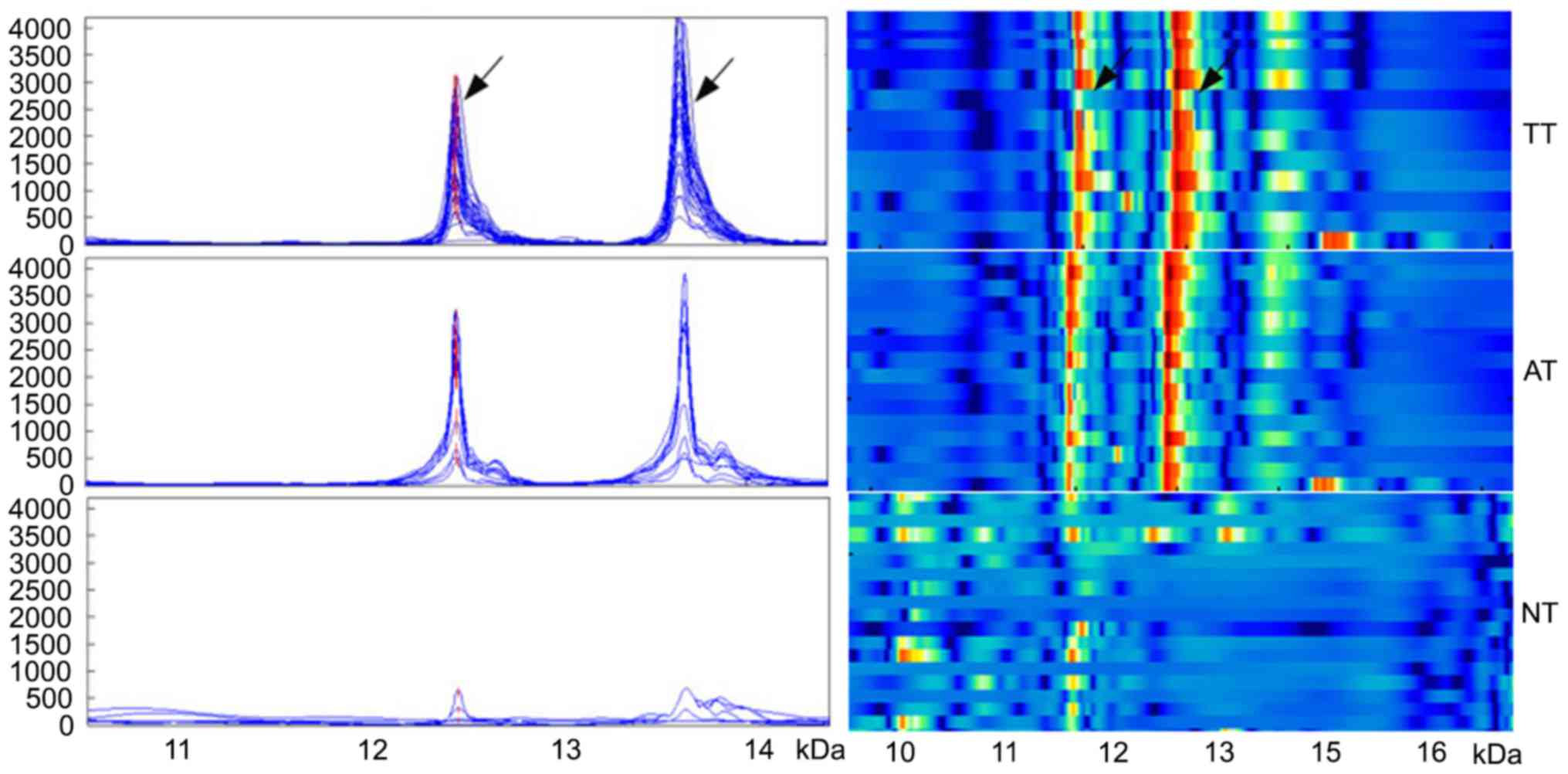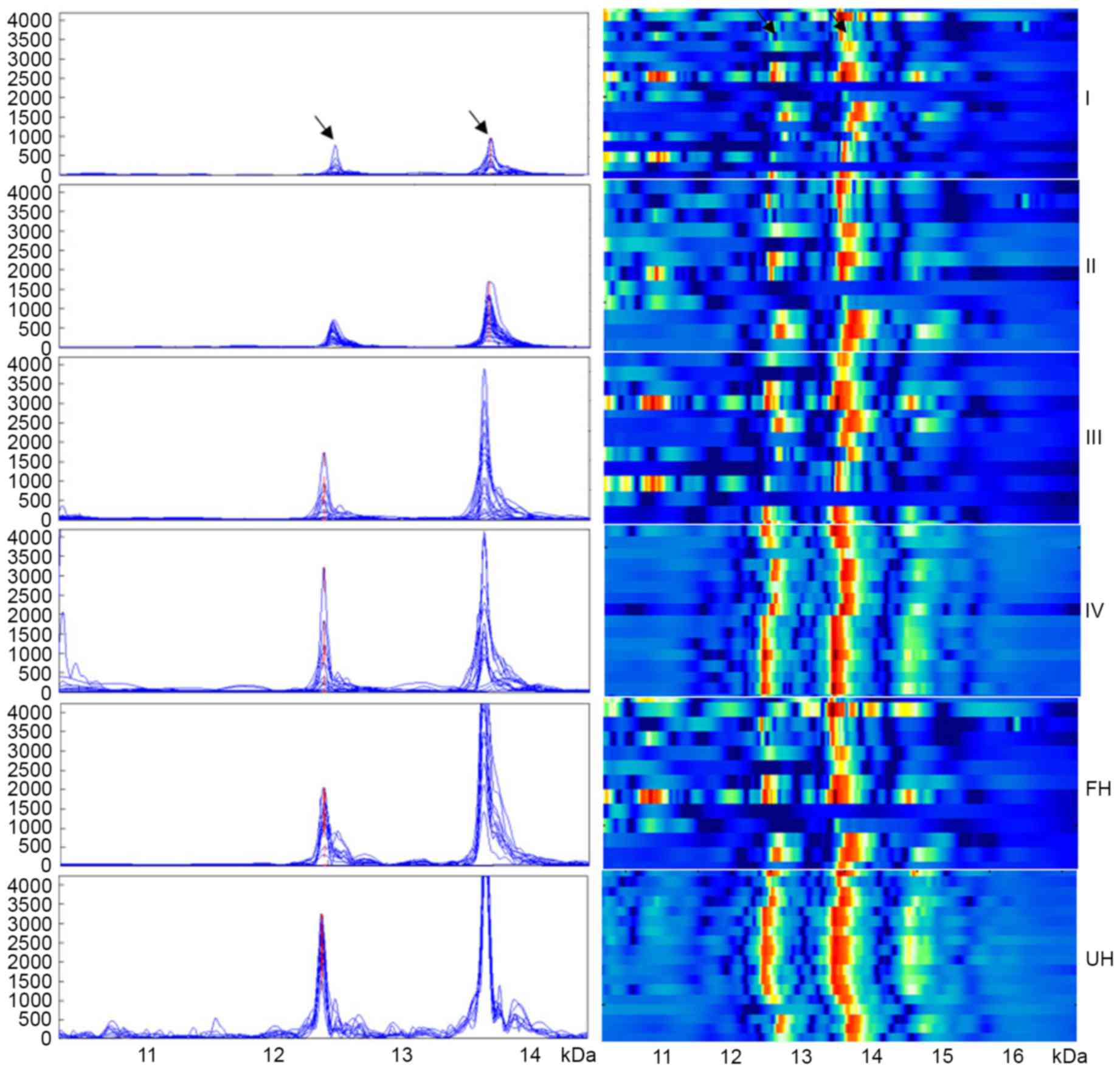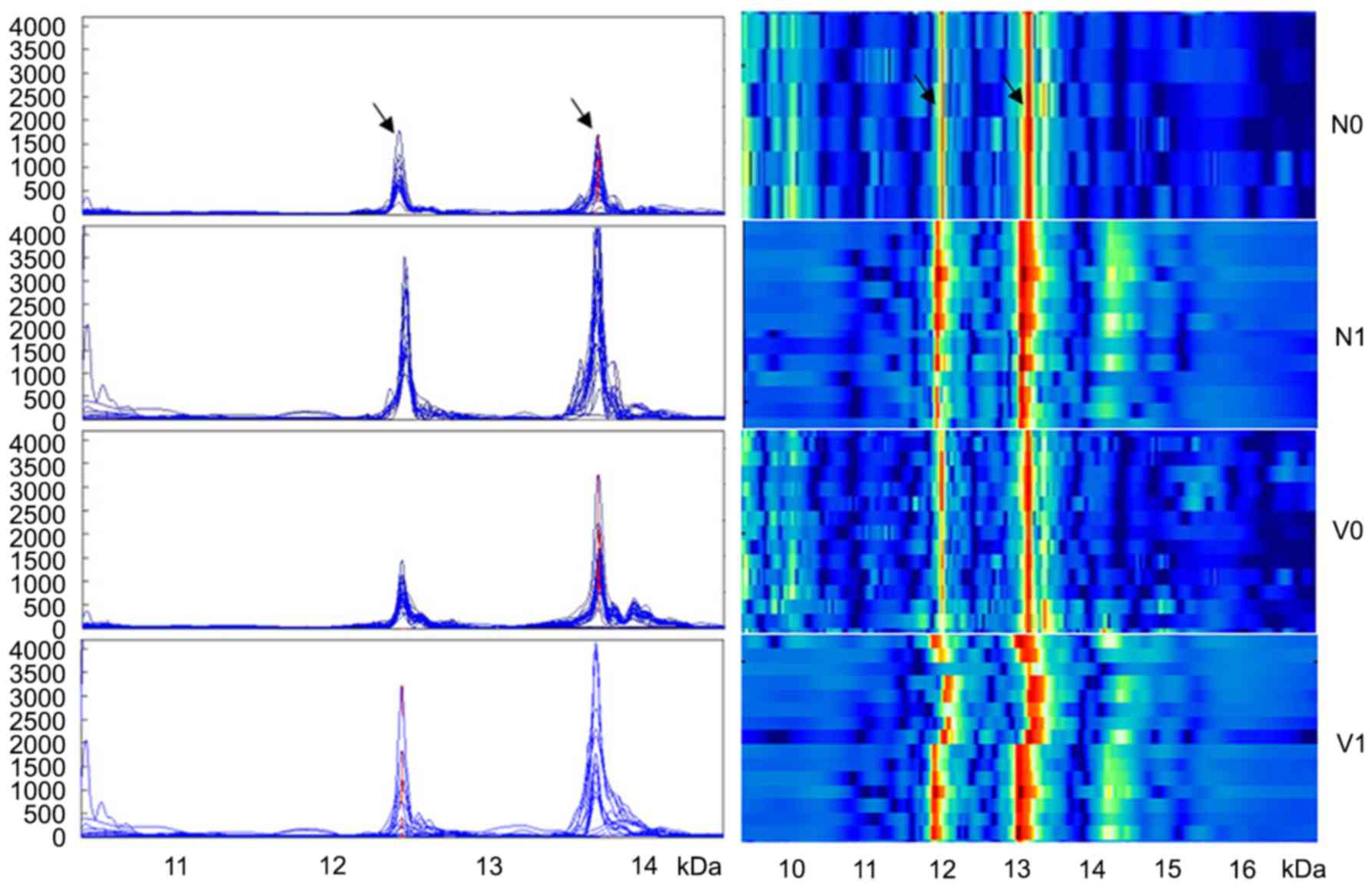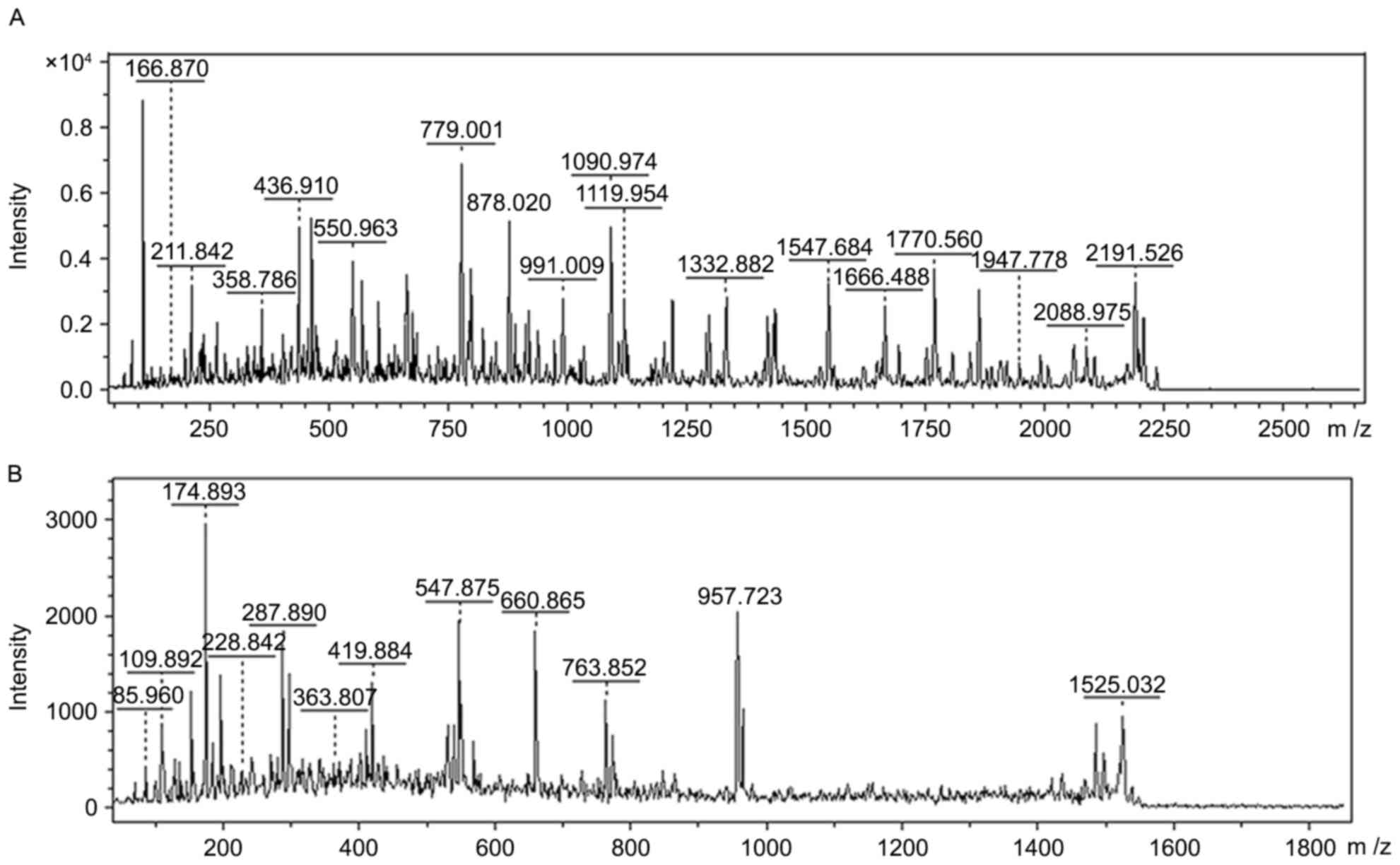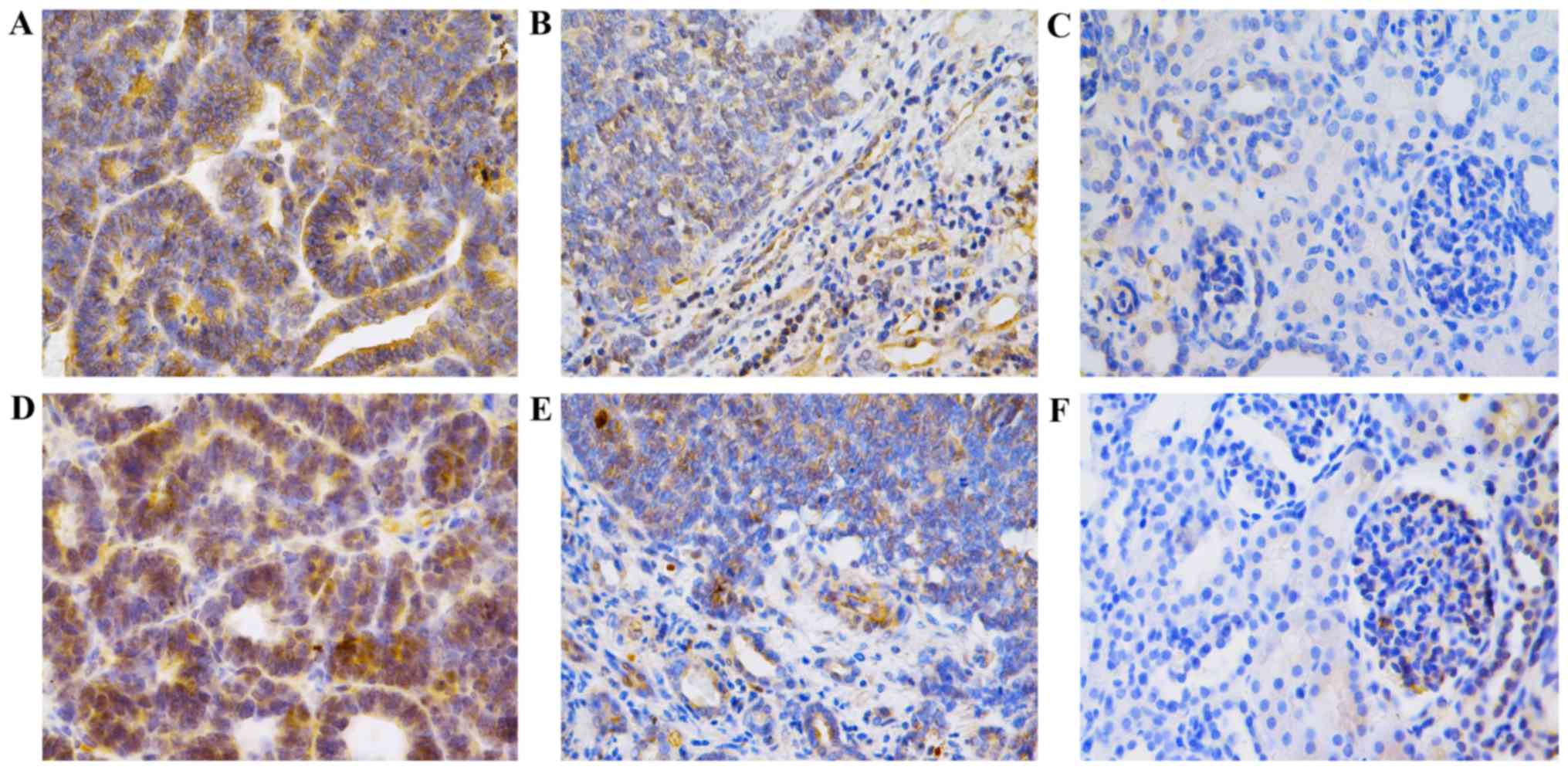|
1
|
Metzger ML and Dome JS: Current therapy
for Wilms tumor. Oncologist. 10:815–826. 2005. View Article : Google Scholar : PubMed/NCBI
|
|
2
|
Fan Y, Shi L, Liu Q, Dong R, Zhang Q, Yang
S, Fan Y, Yang H, Wu P, Yu J, et al: Discovery and identification
of potential biomarkers of papillary thyroid carcinoma. Molecular
Cancer. 8:792009. View Article : Google Scholar : PubMed/NCBI
|
|
3
|
Zhang Q, Wang J, Dong R, Yang S and Zheng
S: Identification of novel serum biomarkers in child nephroblastoma
using proteomics technology. Mol Biol Rep. 38:631–638. 2011.
View Article : Google Scholar : PubMed/NCBI
|
|
4
|
Fan Y and Wang J, Yang Y, Liu Q, Fan Y, Yu
J, Zheng S, Li M and Wang J: Detection and identification of
potential biomarkers of breast cancer. J Cancer Res Clin.
136:1243–1254. 2010. View Article : Google Scholar
|
|
5
|
Mitchell JK, Lemon SM and McGivern DR: How
do persistent infections with hepatitis C virus cause liver cancer?
Curr Opin Virol. 14:101–108. 2015. View Article : Google Scholar : PubMed/NCBI
|
|
6
|
Umansky V and Sevko A: Overcoming
immunosuppression in the melanoma microenvironment induced by
chronic inflammation. Cancer Immunol Immunother. 61:275–282. 2012.
View Article : Google Scholar : PubMed/NCBI
|
|
7
|
Kanterman J, Sade-Feldman M and Baniyash
M: New insights into chronic inflammation-induced
immunosuppression. Semin Cancer Biol. 22:307–318. 2012. View Article : Google Scholar : PubMed/NCBI
|
|
8
|
Ringelhan M, OConnor T, Protzer U and
Heikenwalder M: The direct and indirect roles of HBV in liver
cancer: Prospective markers for HCC screening and potential
therapeutic targets. J Pathol. 235:355–367. 2015. View Article : Google Scholar : PubMed/NCBI
|
|
9
|
Lue H, Kleemann R, Calandra T, Roger T and
Bernhagen J: Macrophage migration inhibitory factor (MIF):
Mechanisms of action and role in disease. Microbes Infect.
4:449–460. 2002. View Article : Google Scholar : PubMed/NCBI
|
|
10
|
Calandra T and Roger T: Macrophage
migration inhibitory factor: A regulator of innate immunity. Nat
Rev Immunol. 3:791–800. 2003. View
Article : Google Scholar : PubMed/NCBI
|
|
11
|
Grieb G, Merk M, Bernhagen J and Bucala R:
Macrophage migration inhibitory factor (MIF): A promising
biomarker. Drug News Perspect. 23:257–264. 2010. View Article : Google Scholar : PubMed/NCBI
|
|
12
|
Meyer-Siegler KL, Iczkowski KA, Leng L,
Bucala R and Vera PL: Inhibition of macrophage migration inhibitory
factor or its receptor (CD74) attenuates growth and invasion of
DU-145 prostate cancer cells. J Immunol. 177:8730–8739. 2006.
View Article : Google Scholar : PubMed/NCBI
|
|
13
|
Choudhary S, Hegde P, Pruitt JR, Sielecki
TM, Choudhary D, Scarpato K, Degraff DJ, Pilbeam CC and Taylor JA
III: Macrophage migratory inhibitory factor promotes bladder cancer
progression via increasing proliferation and angiogenesis.
Carcinogenesis. 34:2891–2899. 2013. View Article : Google Scholar : PubMed/NCBI
|
|
14
|
Arenberg D, Luckhardt TR, Carskadon S,
Zhao L, Amin MA and Koch AE: Macrophage migration inhibitory factor
promotes tumor growth in the context of lung injury and repair. Am
J Resp Crit Care. 182:1030–1037. 2010. View Article : Google Scholar
|
|
15
|
Gámez-Pozo A, Sánchez-Navarro I, Calvo E,
Agulló-Ortuño MT, López-Vacas R, Díaz E, Camafeita E, Nistal M,
Madero R, Espinosa E, et al: PTRF/Cavin-1 and MIF proteins are
identified as non-small cell lung cancer biomarkers by label-free
proteomics. PLoS One. 7:e337522012. View Article : Google Scholar : PubMed/NCBI
|
|
16
|
McClelland M, Zhao L, Carskadon S and
Arenberg D: Expression of CD74, the receptor for macrophage
migration inhibitory factor, in non-small cell lung cancer. Am J
Pathol. 174:638–646. 2009. View Article : Google Scholar : PubMed/NCBI
|
|
17
|
Tanese K, Hashimoto Y, Berkova Z, Wang Y,
Samaniego F, Lee JE, Ekmekcioglu S and Grimm EA: Cell Surface
CD74-MIF interactions drive melanoma survival in response to
interferon-γ. J Invest Dermatol. 135:2775–2784. 2015. View Article : Google Scholar : PubMed/NCBI
|
|
18
|
Gordon-Weeks AN, Lim SY, Yuzhalin AE,
Jones K and Muschel R: Macrophage migration inhibitory factor: A
key cytokine and therapeutic target in colon cancer. Cytokine
Growth Factor Rev. 26:451–461. 2015. View Article : Google Scholar : PubMed/NCBI
|
|
19
|
Chang KP, Lin SJ, Liu SC, Yi JS, Chien KY,
Chi LM, Kao HK, Liang Y, Lin YT, Chang YS and Yu JS:
Low-molecular-mass secretome profiling identifies HMGA2 and MIF as
prognostic biomarkers for oral cavity squamous cell carcinoma. Sci
Rep. 5:116892015. View Article : Google Scholar : PubMed/NCBI
|
|
20
|
Verjans E, Noetzel E, Bektas N, Schütz AK,
Lue H, Lennartz B, Hartmann A, Dahl E and Bernhagen J: Dual role of
macrophage migration inhibitory factor (MIF) in human breast
cancer. BMC Cancer. 9:2302009. View Article : Google Scholar : PubMed/NCBI
|
|
21
|
Richard V, Kindt NG, Decaestecker C,
Gabius HJ, Laurent G, Noël JC and Saussez S: Involvement of
macrophage migration inhibitory factor and its receptor (CD74) in
human breast cancer. Oncol Rep. 32:523–529. 2014.PubMed/NCBI
|
|
22
|
Kindt N, Lechien JR, Nonclercq D, Laurent
G and Saussez S: Involvement of CD74 in head and neck squamous cell
carcinomas. J Cancer Res Clin. 140:937–947. 2014. View Article : Google Scholar
|
|
23
|
Mittelbronn M, Platten M, Zeiner P,
Dombrowski Y, Frank B, Zachskorn C, Harter PN, Weller M and
Wischhusen J: Macrophage migration inhibitory factor (MIF)
expression in human malignant gliomas contributes to immune escape
and tumour progression. Acta Neuropathol. 122:353–365. 2011.
View Article : Google Scholar : PubMed/NCBI
|
|
24
|
Krockenberger M, Dombrowski Y, Weidler C,
Ossadnik M, Hönig A, Häusler S, Voigt H, Becker JC, Leng L, Steinle
A, et al: Macrophage migration inhibitory factor (MIF) contributes
to the immune escape of ovarian cancer by downregulating NKG2D1. J
Immunol. 180:7338–7348. 2008. View Article : Google Scholar : PubMed/NCBI
|
|
25
|
Zhou Q, Yan X, Gershan J, Orentas RJ and
Johnson BD: Expression of macrophage migration inhibitory factor by
neuroblastoma leads to the inhibition of antitumor T cell
reactivity in vivo. J Immunol. 181:1877–1886. 2008. View Article : Google Scholar : PubMed/NCBI
|
|
26
|
Pillai MM, Iwata M, Awaya N, Graf L and
Torok-Storb B: Monocyte-derived CXCL7 peptides in the marrow
microenvironment. Blood. 107:3520–3526. 2006. View Article : Google Scholar : PubMed/NCBI
|
|
27
|
Pecks U, Kirschner I, Wölter M, Schlembach
D, Koy C, Rath W and Glocker MO: Mass spectrometric profiling of
cord blood serum proteomes to distinguish infants with intrauterine
growth restriction from those who are small for gestational age and
from control individuals. Transl Res. 164:57–69. 2014. View Article : Google Scholar : PubMed/NCBI
|
|
28
|
Ehlken C, Grundel B, Michels D, Junker B,
Stahl A, Schlunck G, Hansen LL, Feltgen N, Martin G, Agostini HT
and Pielen A: Increased expression of angiogenic and inflammatory
proteins in the vitreous of patients with ischemic central retinal
vein occlusion. PLoS One. 10:e01268592015. View Article : Google Scholar : PubMed/NCBI
|
|
29
|
Yeo L, Adlard N, Biehl M, Juarez M,
Smallie T, Snow M, Buckley CD, Raza K, Filer A and Scheel-Toellner
D: Expression of chemokines CXCL4 and CXCL7 by synovial macrophages
defines an early stage of rheumatoid arthritis. Ann Rheum Dis.
75:763–771. 2016. View Article : Google Scholar : PubMed/NCBI
|
|
30
|
Ghasemzadeh M, Kaplan ZS, Alwis I,
Schoenwaelder SM, Ashworth KJ, Westein E, Hosseini E, Salem HH,
Slattery R, McColl SR, et al: The CXCR1/2 ligand NAP-2 promotes
directed intravascular leukocyte migration through platelet
thrombi. Blood. 121:4555–4566. 2013. View Article : Google Scholar : PubMed/NCBI
|
|
31
|
Giuliano S, Guyot M, Grépin R and Pagès G:
The ELR+CXCL chemokines and their receptors CXCR1/CXCR2: A
signaling axis and new target for the treatment of renal cell
carcinoma. OncoImmunology. 3:e283992014. View Article : Google Scholar : PubMed/NCBI
|
|
32
|
Matsubara J, Honda K, Ono M, Tanaka Y,
Kobayashi M, Jung G, Yanagisawa K, Sakuma T, Nakamori S, Sata N, et
al: Reduced plasma level of CXC chemokine ligand 7 in patients with
pancreatic cancer. Cancer Epidemiol Biomarkers Prev. 20:160–171.
2011. View Article : Google Scholar : PubMed/NCBI
|
|
33
|
Tang Z, Yu M, Miller F, Berk RS, Tromp G
and Kosir MA: Increased invasion through basement membrane by
CXCL7-transfected breast cells. Am J Surg. 196:690–696. 2008.
View Article : Google Scholar : PubMed/NCBI
|
|
34
|
Grépin R, Guyot M, Giuliano S, Boncompagni
M, Ambrosetti D, Chamorey E, Scoazec JY, Negrier S, Simonnet H and
Pagès G: The CXCL7/CXCR1/2 axis is a key driver in the growth of
clear cell renal cell carcinoma. Cancer Res. 74:873–883. 2014.
View Article : Google Scholar : PubMed/NCBI
|
|
35
|
Desurmont T, Skrypek N, Duhamel A,
Jonckheere N, Millet G, Leteurtre E, Gosset P, Duchene B, Ramdane
N, Hebbar M, et al: Overexpression of chemokine receptor CXCR2 and
ligand CXCL7 in liver metastases from colon cancer is correlated to
shorter disease-free and overall survival. Cancer Sci. 106:262–269.
2015. View Article : Google Scholar : PubMed/NCBI
|
|
36
|
Xu L, Li Y, Sun H, Zhen X, Qiao C, Tian S
and Hou T: Current developments of macrophage migration inhibitory
factor (MIF) inhibitors. Drug Discov Today. 18:592–600. 2013.
View Article : Google Scholar : PubMed/NCBI
|















